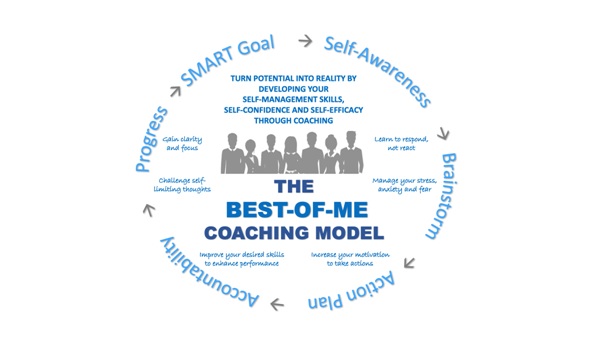A Coaching Model Created by Kathrine Anne Minzlaff
(Young Professionals Coach, AUSTRIA)
 About the Model
About the Model
BEST-OF-ME stands for: Balanced, Effective, Successful, Takes charge- Optimistic, Focused – Motivated, Engaged. These are words representing just some of the positive attributes that the model intends to draw out of the clients as they create the best version of themselves.
The BEST-OF-ME coaching model is specially designed to empower young professionals and help them realize their full potential by developing their self-management skills.
Self-management skills empower clients to set goals and channel their thoughts, feelings, and action towards achieving their goals (Cottrell, 2003). By developing self-management skills, individuals learn to oversee and screen their conduct and manage the choices they make. Once they possess these skills, they can consistently set their goals independently and take the initiative to achieve them. With this purposeful self-management, young professionals can direct their career trajectory and ensure they seek opportunities that get them closer to their goals.
BEST-OF-ME is based on a problem-solving, solution-focused, and goal-setting structure created to:
The Client
The client, who is the coaching relationship’s central focus, is responsible for presenting the session topic.
The model recognizes the client as an autonomous learner who has a foundation of knowledge and life experience from which he/she can generalize, the willingness to learn, and the capacity for self-direction.
Client Niche: Young Professionals
The BEST-OF-ME model is a result-oriented, systematic process that targets young individuals in their 20s and 30s employed in a profession or white-collar occupation.
The model aims to equip young professionals with the required knowledge and tools to cultivate their self-awareness and self-management skills. It can also help them develop other essential competencies to complete their tasks and achieve their workplace goals effectively. Some examples of these competencies include:
The Coach
The coach empowers the client to clarify goals, create action plans, move past obstacles, and achieve what the client chooses.
The coach is responsible for keeping the client-focused and holding the client accountable for accomplishing the steps necessary for achieving the identified goals.
It is also the coach’s role to help keep the client on track and help him/her monitor and evaluate progress over time and provide the client with an environment for brainstorming and self-reflection.
The Process
The BEST-OF-ME coaching model is a circular (iterative) process comprised of five steps that a coach would guide the client through:
- EstablishaSMART goal
- Utilize the coaching space for self-reflection and creating Self-Awareness
- Brainstorm for workable solutions
- Design an action plan
- TakeAccountabilityfor the defined actions
- Monitor and manage Progress over time
Integrated Approach
The BEST-OF-ME coaching model integrates into the coaching process three evidence-based frameworks – cognitive-behavioral coaching, motivational interviewing, and mindfulness – to support the client in achieving their SMART goals by considering and addressing three factors that can influence the outcome of coaching (Minzlaff, 2019):
Below are short descriptions of how each of these tools can be incorporated into the coaching engagement (Minzlaff, 2019).
Cognitive Behavioral Coaching
The central concept of using a cognitive-behavioral approach is to encourage the clients to identify any of their irrational beliefs and then help them challenge them through various techniques: reframing, immersion, visualization, and homework tasks support the activities coaching process.
Motivational Interviewing
The motivational interviewing approach requires the coach to recognize and understand ambivalence as a natural part of the change process and allow the client to verbalize the discrepancy between actual and desired behaviors and the associated thoughts and feelings.
Mindfulness
By practicing self-directed mental techniques (such as relaxation exercises) while getting coached, individuals learn to control attention and reduce emotional activity (i.e., improve self-regulation) and utilize their cognitive resources more fully in the service of goal attainment.
References
Cottrell, S. (2003). Skills for success: personal development and employability. Houndsmills, Basingstoke, Hampshire; New York: Palgrave Macmillan, pp 60 – 88.
Minzlaff, K. A. (2019). Organizational coaching: integrating motivational interviewing and mindfulness with cognitive-behavioral coaching. Coaching: An International Journal of Theory, Research, and Practice, 12(1), 15-28.